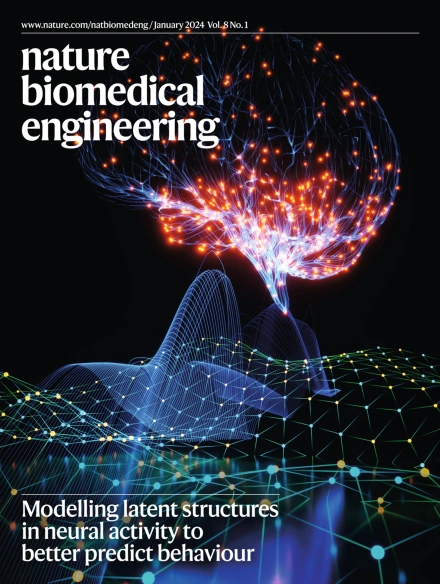用于增强癌症疗法疗效的粘弹性合成抗原递呈细胞
IF 26.8
1区 医学
Q1 ENGINEERING, BIOMEDICAL
引用次数: 0
摘要
使用合成抗原递呈细胞激活和扩增工程 T 细胞来治疗癌症,通常会导致治疗效果和持久性不理想。在这里,我们描述了一种高通量微流体系统,用于制造模拟抗原递呈细胞粘弹性和 T 细胞激活特性的合成细胞。与刚性或弹性微球相比,合成粘弹性T细胞激活细胞(SynVACs)大大提高了人类CD8+ T细胞的扩增能力,并抑制了调节性T细胞的形成。值得注意的是,用SynVACs激活和扩增奇异抗原受体(CAR)T细胞,可使CAR转导效率达到约90%,并大幅增加T记忆干细胞。经改造的CAR T细胞能消灭人类淋巴瘤小鼠模型中的肿瘤细胞,抑制人类卵巢癌异种移植小鼠的肿瘤生长,延长肿瘤存活时间,降低肿瘤复发风险。我们的研究结果强调了粘弹性在T细胞工程中的关键作用,并突出了SynVACs在癌症治疗中的实用性。本文章由计算机程序翻译,如有差异,请以英文原文为准。


Viscoelastic synthetic antigen-presenting cells for augmenting the potency of cancer therapies
The use of synthetic antigen-presenting cells to activate and expand engineered T cells for the treatment of cancers typically results in therapies that are suboptimal in effectiveness and durability. Here we describe a high-throughput microfluidic system for the fabrication of synthetic cells mimicking the viscoelastic and T-cell-activation properties of antigen-presenting cells. Compared with rigid or elastic microspheres, the synthetic viscoelastic T-cell-activating cells (SynVACs) led to substantial enhancements in the expansion of human CD8+ T cells and to the suppression of the formation of regulatory T cells. Notably, activating and expanding chimaeric antigen receptor (CAR) T cells with SynVACs led to a CAR-transduction efficiency of approximately 90% and to substantial increases in T memory stem cells. The engineered CAR T cells eliminated tumour cells in a mouse model of human lymphoma, suppressed tumour growth in mice with human ovarian cancer xenografts, persisted for longer periods and reduced tumour-recurrence risk. Our findings underscore the crucial roles of viscoelasticity in T-cell engineering and highlight the utility of SynVACs in cancer therapy. Synthetic cells mimicking the viscoelastic and T-cell-activation properties of antigen-presenting cells provide substantial enhancements in the expansion and potency of engineered human cytotoxic T cells.
求助全文
通过发布文献求助,成功后即可免费获取论文全文。
去求助
来源期刊

Nature Biomedical Engineering
Medicine-Medicine (miscellaneous)
CiteScore
45.30
自引率
1.10%
发文量
138
期刊介绍:
Nature Biomedical Engineering is an online-only monthly journal that was launched in January 2017. It aims to publish original research, reviews, and commentary focusing on applied biomedicine and health technology. The journal targets a diverse audience, including life scientists who are involved in developing experimental or computational systems and methods to enhance our understanding of human physiology. It also covers biomedical researchers and engineers who are engaged in designing or optimizing therapies, assays, devices, or procedures for diagnosing or treating diseases. Additionally, clinicians, who make use of research outputs to evaluate patient health or administer therapy in various clinical settings and healthcare contexts, are also part of the target audience.
 求助内容:
求助内容: 应助结果提醒方式:
应助结果提醒方式:


